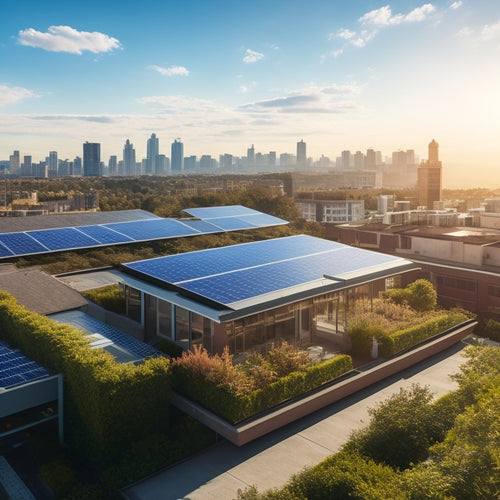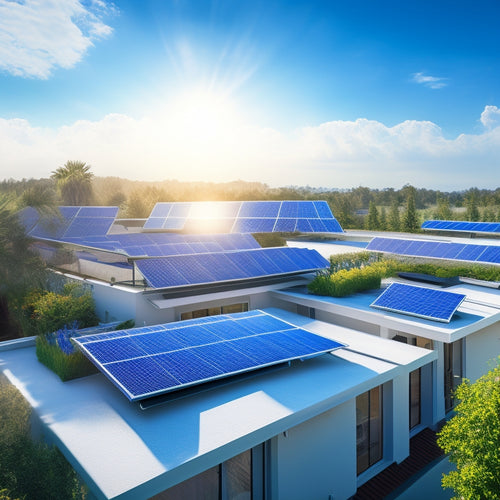
Cut Energy Costs With Commercial Solar Power
Share
By investing in commercial solar power, you can substantially cut your energy costs while supporting a sustainable future. With energy independence from the grid, you'll reduce your exposure to fluctuating energy prices. Plus, advancements in technology have made solar panels more efficient and cost-effective, generating energy even on cloudy days. With a well-designed system, you'll maximize energy production and efficiency, leading to long-term energy savings and a lower bottom line. Now, explore how you can harness the power of the sun to reduce your energy expenditure and contribute to a cleaner environment.
Key Takeaways
• Commercial solar power reduces energy costs by generating free energy from sunlight, lowering reliance on grid electricity.
• Conducting an energy audit and implementing energy-efficient measures maximizes energy savings with commercial solar power.
• A well-designed solar power system optimizes energy production and efficiency, leading to significant cost savings over time.
• Federal tax credits and state rebate programs can substantially reduce the upfront costs of installing a commercial solar power system.
• Long-term energy savings from commercial solar power provide a hedge against inflation, reducing energy expenditure and the bottom line.
Understanding Solar Power Benefits
As you consider investing in commercial solar power, you must understand the benefits that come with harnessing renewable energy from the sun.
One of the most significant advantages is energy independence. By generating your own electricity, you're no longer reliant on the grid, reducing your exposure to fluctuating energy prices.
This autonomy also allows you to maintain business continuity during grid outages or natural disasters.
Don't let solar myths hold you back from reaping these benefits.
Contrary to popular belief, solar panels can still generate energy on cloudy days, albeit at a reduced rate. Additionally, advancements in technology have made solar panels more efficient and cost-effective.
With commercial solar power, you'll reduce your carbon footprint, contributing to a cleaner environment and enhancing your brand's reputation.
By investing in solar, you'll also lock in fixed energy rates, protecting your business from rising energy costs.
How Commercial Solar Works
Your commercial solar power system harnesses sunlight through a series of photovoltaic (PV) panels, converting it into electrical energy that powers your business operations.
As sunlight hits the panels, it excites the electrons, generating a direct current (DC) electricity. An inverter then converts the DC power into alternating current (AC) electricity, which is usable for your business.
A well-designed system maximizes energy production and efficiency. A thorough system design considers factors like your energy usage patterns, roof size, and local building codes. This guarantees a tailored solution that meets your unique energy needs.
To optimize energy usage, energy storage systems can be integrated into your commercial solar power setup. These systems store excess energy generated during the day for use during periods of low sunlight or at night. This guarantees a steady and reliable energy supply, reducing your reliance on the grid.
Reducing Energy Consumption Costs
By investing in a commercial solar power system, you'll substantially reduce your energy consumption costs, slashing your utility bills and boosting your bottom line. A vital step in achieving this is conducting an energy audit to identify areas of inefficiency in your energy usage. This thorough assessment will help you pinpoint opportunities to optimize your energy consumption, leading to substantial cost savings.
| Energy Audit Category | Current Energy Usage | Potential Savings |
| Lighting | 20,000 kWh/month | 30% reduction |
| HVAC | 15,000 kWh/month | 25% reduction |
| Refrigeration | 10,000 kWh/month | 20% reduction |
A cost analysis of your energy consumption will also reveal opportunities to reduce energy waste and optimize your energy usage. By implementing energy-efficient measures and investing in a commercial solar power system, you can notably reduce your energy consumption costs. With a detailed understanding of your energy usage and a well-designed solar power system, you'll be able to maximize your energy savings and reap the benefits of a lower bottom line.
Solar Panel System Installation
Installing a commercial solar panel system requires a thorough site assessment to identify the ideal location, orientation, and configuration for maximum energy harvesting.
This assessment guarantees that your system is designed to generate the most energy possible, reducing your reliance on the grid and saving you money.
Your system design will take into account factors like roof size, shading, and local building codes.
A well-designed system will also guarantee that your panels are installed at the perfect angle and direction to capture the most sunlight.
Once installed, you'll want to verify that your system is properly maintained to achieve peak performance.
Regular panel maintenance is vital to prevent debris buildup and confirm your system operates at maximum efficiency.
Federal and State Incentives
As you consider commercial solar power for your business, you'll want to explore the various federal and state incentives that can help offset the upfront costs.
You'll find that federal tax credits and state rebate programs can substantially reduce the financial burden of installing a solar panel system.
Federal Tax Credits
You can claim a significant portion of your commercial solar power system's cost as a credit against your federal income taxes.
As a business owner, you're eligible for the Solar Investment Tax Credit (ITC), which allows you to claim a credit of up to 26% of the total cost of your solar power system. This credit can be claimed against your federal income taxes, providing a substantial reduction in your tax liability.
To be eligible for the ITC, your commercial solar power system must be operational and generating electricity.
Additionally, the system must be placed in service during the tax year in which you're claiming the credit.
You'll need to file Form 5695 with your tax return to claim the credit.
You must keep accurate records of your system's installation, maintenance, and operation, as these will be required to support your credit claim.
State Rebate Programs
Beyond federal incentives, many states and utilities offer rebate programs that can substantially reduce the upfront cost of your commercial solar power system.
These state-specific incentives can help you save even more money on your investment. To take advantage of these programs, you'll need to determine your rebate eligibility, which typically depends on factors like system size, installation date, and project location.
You'll also need to navigate the program administration process, which may involve submitting applications, providing documentation, and meeting specific requirements.
Some states offer upfront rebates, while others provide performance-based incentives that reward you for the energy your system produces.
You may also need to work with your utility company to facilitate a smooth interconnection process. Be sure to research the specific programs available in your area and plan accordingly.
Long-Term Energy Savings
Your organization can reap substantial financial benefits by harnessing commercial solar power, which translates to significant long-term energy savings.
By investing in solar energy, you'll reduce your reliance on grid electricity, leading to lower energy bills. A thorough cost analysis will reveal the potential savings, which can be substantial, especially for businesses with high energy consumption.
Energy efficiency is a key benefit of commercial solar power. With solar panels, you'll generate clean energy on-site, reducing your energy expenditure.
This, in turn, leads to significant cost savings over the long term. Additionally, as energy costs continue to rise, your solar-powered energy savings will increase, providing a hedge against inflation.
Going Green With Solar Energy
By integrating solar energy into your operations, your organization can substantially reduce its carbon footprint and contribute to a cleaner, more sustainable environment.
As a business owner, you're not only reducing your energy costs but also doing your part for the environment.
Going green with solar energy has numerous environmental benefits, including:
Reduced greenhouse gas emissions: Solar energy generates electricity without burning fossil fuels, which reduces your organization's carbon footprint and contributes to a cleaner environment.
Minimal water usage: Solar panels require very little water to operate, unlike traditional power plants that use significant amounts of water for cooling.
Conservation of natural resources: Solar energy harnesses the power of the sun, reducing reliance on finite natural resources like coal and gas.
Improved air quality: By reducing your reliance on fossil fuels, you're also reducing air pollutants that can harm human health and the environment.
Frequently Asked Questions
Can I Install Commercial Solar Panels on a Leased Building?
You'll need to review your lease agreements and obtain landlord approval before installing commercial solar panels on a leased building, ensuring you understand any restrictions and obligations outlined in your contract.
Do Solar Panels Require Frequent Cleaning and Maintenance?
You'll want to clean your solar panels regularly to prevent dust accumulation, which can reduce panel efficiency by up to 25%. Set a cleaning schedule to maintain peak performance and minimize maintenance costs.
Are Commercial Solar Panels Resistant to Extreme Weather?
You'll be relieved to know that commercial solar panels are designed with weatherproofing materials, ensuring they can withstand harsh conditions, including hurricane-force winds, and are built to last with minimal maintenance.
Can I Expand My Solar Panel System in the Future?
You can easily expand your solar panel system in the future as your energy needs grow, simply by adding more panels, which will further boost your energy efficiency through system upgrades.
Do Commercial Solar Panels Void the Roof Warranty?
When you install commercial solar panels, you're likely wondering if they'll void your roof warranty. Typically, it depends on the roof material and warranty duration; some manufacturers allow installations without voiding the warranty, while others might.
Related Posts
-

What Role Do Unicycles Play in Urban Transport?
As you navigate through congested city streets, unicycles emerge as a viable solution, slashing carbon emissions by u...
-

What Is the Cost to Put in Solar Panels
You're likely considering solar panels for your home, and the most significant factor in your decision is the upfront...
-

Best Solar Panel Options for Maximum Energy Savings
You can maximize your energy savings with solar panels that boast efficiency ratings above 20%, paired with extensive...


